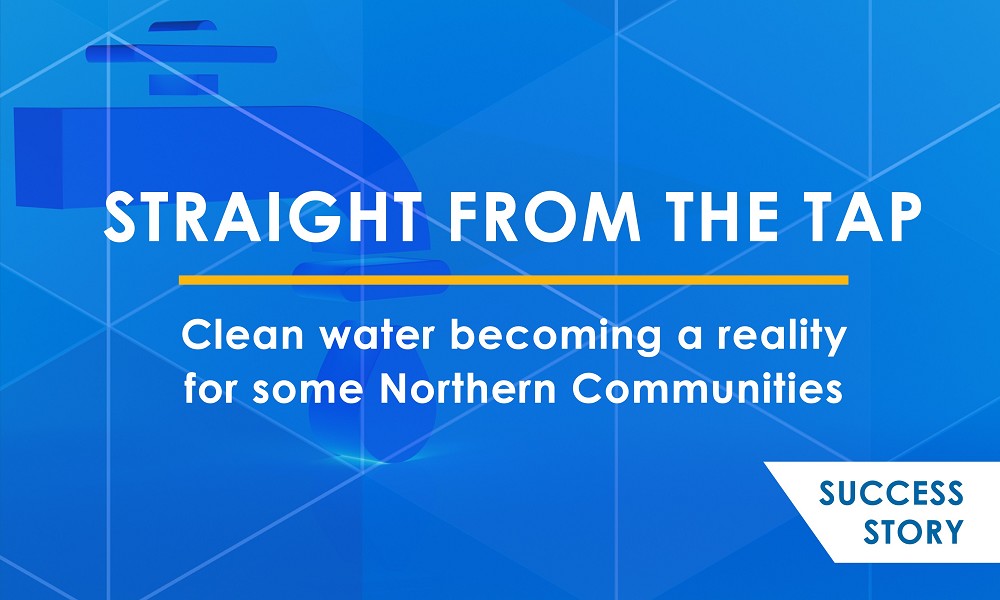Straight from the Tap: Clean water becoming a reality for Some Northern Communities
December 1, 2021 - Straight from the Tap: Clean water becoming a reality for Some Northern Communities

Clean drinking water is a necessity: if it’s not available, it makes living difficult. It is essential, whether it be for drinking, cooking, or domestic use. If a community has access to a consistent supply of clean water, it provides prosperity and economic opportunities. According to the (WHO), “improved water supply and sanitation, and better management of water resources, can boost countries’ economic growth and can contribute greatly to poverty reduction”.
After many years of living under Drinking Water Advisories (DWA), many First Nations communities in Northwestern Ontario have had these advisories removed. For example, a new water treatment plant became operational in Regina Bay, so members of Animakee Wa Zing First Nation community can now drink water straight from the tap. Additionally, another water treatment plant is expected to be ready by October on Windigo Island. Landa McVicar, the Chief of Animakee Wa Zhing #37 First Nation, said that it would “open the door for a lot of things, economically and opportunities [wise]”. However, Mcvar also pointed out the need to focus on educating the communities, so they feel confident when drinking the water directly from the tap after many years of living under DWA.
Even though, infrastructure is important, the training about operating these water treatment plants coupled with the sense of ownership would be key to sustained success. On this front, Walkerton Clean Water Centre in partnership with Ontario First Nations Technical Services Corporation and Keewaytinook Okimakanak of the Northern Chiefs Council have launched two different courses tailored to address the needs of operating First Nations drinking water systems. More information about these courses can be found on their website.
On August 4, Indigenous Services Canada (ISC) provided updates on the progress made on lifting DWA in various First Nations communities. Nibinamik First Nation has started work on upgrading their water treatment plant to resolve the drinking water issues faced by the community and lift its DWA, which has been in effect since 2013. Overall, “First Nations communities [across Canada] have lifted 108 long-term drinking water advisories, restoring reliable access to safe drinking water for approximately 6,350 homes and 467 buildings in 79 communities since November 2015”. However, there are still many communities under DWA. According to the Government of Canada, 34 DWA are still in place in 23 communities in Ontario. Therefore, in December 2020, the federal government announced additional funding of $1.5 billion to accelerate the process of removing long-term DWA in various communities.
Additionally, the federal government has reached a settlement in two national class action lawsuits with First Nations living under DWA. The total settlement amount would be about $8 billion, and $1.5 billion of it will be provided as compensation to the people who were deprived of clean drinking water. Emily Whetung-Maclnnes, Chief of Curve Lake First Nation, felt satisfied with the settlement agreement. She said “I think the total agreement really satisfies the need of First Nations across Canada… [t]here's a recognition that individuals have suffered harms from not having access to clean water". The actions taken to provide clean water to the various communities affected by DWA should help make the lives of the people living in these communities easier.
In conclusion, even though, there have been several steps taken to improve clean drinking water accessibility in various First Nations communities, there is still much work to do.
Works Cited
Canada, Indigenous Services. “Government of Canada Progress Update on Improving Access to Clean Water in First Nations Communities.” Canada.ca. Government of Canada, August 4, 2021. https://www.canada.ca/en/indigenous-services-canada/news/2021/08/government-of-canada-progress-update-on-improving-access-to-clean-water-in-first-nations-communities.html.
“Drinking-Water.” World Health Organization. World Health Organization. Accessed November 1, 2021. https://www.who.int/news-room/fact-sheets/detail/drinking-water.
“First Nations and Ottawa Agree to $8-Billion Settlement on Drinking Water Advisories | CBC News.” CBCnews. CBC/Radio Canada, July 31, 2021. https://www.cbc.ca/news/politics/drinking-water-class-action-proposed-settlement-1.6123251#:~:text=Politics-,First%20Nations%20and%20Ottawa%20agree%20to%20%248%2Dbillion%20settlement%20on,Nations%20under%20drinking%20water%20advisories.
Government of Canada; Indigenous Services Canada. “Remaining Long-Term Drinking Water Advisories.” Government of Canada; Indigenous Services Canada, October 28, 2021. https://www.sac-isc.gc.ca/eng/1614387410146/1614387435325.
“'Really Good News': Clean Water a Reality for 2 Northwestern Ontario Indigenous Communities | CBC News.” CBCnews. CBC/Radio Canada, September 20, 2021. https://www.cbc.ca/news/canada/thunder-bay/boil-water-advisories-1.6182655.
Samrul Aahad is an Economist at NPI
Write for us
The content of Northern Policy Institute’s blog is for general information and use. The views expressed in this blog are those of the author and do not necessarily reflect the opinions of Northern Policy Institute, its Board of Directors or its supporters. The authors take full responsibility for the accuracy and completeness of their respective blog posts. Northern Policy Institute will not be liable for any errors or omissions in this information, nor will Northern Policy Institute be liable for any detriment caused from the display or use of this information. Any links to other websites do not imply endorsement, nor is Northern Policy Institute responsible for the content of the linked websites.
Northern Policy Institute welcomes your feedback and comments. Please keep comments to under 500 words. Any submission that uses profane, derogatory, hateful, or threatening language will not be posted. Please keep your comments on topic and relevant to the subject matter presented in the blog. If you are presenting a rebuttal or counter-argument, please provide your evidence and sources. Northern Policy Institute reserves the right to deny any comments or feedback submitted to www.northernpolicy.ca that do not adhere to these guidelines.
